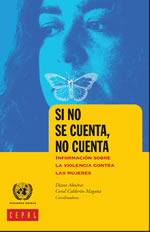If Not Counted, Violence Against Women Does Not Count

Photo: Talita Oliveira, Flickr
A comprehensive overview of the information available on violence against women in Latin America and the Caribbean –especially in Argentina, Guatemala, Peru and in the Caribbean subregion– can be found in the study produced by ECLAC’s Gender Division as part of a project implemented by the five United Nations regional commissions.
The report entitled Si no se cuenta, no cuenta. Información sobre la violencia contra las mujeres (If not counted, it does not count. Information on violence against women) analyzes the capacity of each country to produce data and assess the impact of several public initiatives on the prevention, punishment and eradication of this problem in the region.
The interregional project “Enhancing capacities to eradicate violence against women through networking of local knowledge communities” implemented by ECLAC in Latin America and the Caribbean responds to UN Secretary-General Ban Ki-moon’s call for calculating figures on this phenomenon under his campaign “Unite to End Violence against Women”, launched in 2008.
The data shown in the study are revealing: countries in Latin America and the Caribbean reported only 48.5% of the information requested by the United Nations for completing Secretary-General's database on violence against women. The region is behind of Europe (64.4%), although it is better positioned than Africa (20.8%) and the Pacific (14.3%).
The document contains a series of recommendations to be applied both at national and regional levels to enhance countries’ response. Mostly, the proposal is “to promote the creation of a comprehensive, leak-free intervention system that fosters internal coherence for a sectoral response, operates under strong political leadership and relies on adequate and continuous financing”.
The system proposed, which should be considered a State policy, requires broad debate processes and the search for consensus. “The health, justice, social services, employment and education sectors; institutions for women and civil society issues; and the academia could provide input based on their specific expertise,” reads the report.
The first part of the study maintains a regional perspective, whereas the second part presents the case studies of Argentina, Guatemala, Peru and the Caribbean – especially Trinidad and Tobago.
As stated in the document, Latin America and the Caribbean have carried out several efforts –with different levels of progress– envisaged to unify the records of the various public institutions addressing cases of violence against women.
Trinidad and Tobago, Dominica and Santa Lucia, located in the Caribbean subregion, have shown progress on this matter, probably benefitted by their reduced territories and populations, a fact that implies a more manageable amount of information.
Ecuador is advancing on the formulation of a unified registry supported by several government institutions, whereas Guatemala is also working on the coordination of efforts to document cases, as required by the law against feminicide and other forms of violence.
This ECLAC study underlines that “most countries in the region have civil or criminal laws (or both) for addressing various forms of violence against women, especially domestic violence”, although sexual violence within marriage, human trafficking or sexual harassment are less regulated.
On the other hand, few countries in Latin America and the Caribbean have comprehensive laws that coordinate institutions and programmes to fight gender-based violence, as it happens in Argentina, Colombia and Mexico. “But even in countries without such comprehensive laws, legal systems define specific regulations addressing various forms of violence and their corresponding processes”, reads the text.
While the report underlines the importance of an adequate legislation for eradicating this problem, it reminds that “the problem of violence against women, being complex and depending on a broad range of factors, can not be exclusively solved by laws or through psychological and social assistance. Actions aiming to transform the culture and the conditions in which social relationships are established and consolidated are also necessary”.
“We have set out on this journey. It is time to continue working
and produce increasingly accessible and high-quality information,
enhance transparency and increased efforts based on a better
understanding of the critical hindrances that need to be
eliminated when moving towards the goal of preventing and
eradicating violence against women,” the text concludes.
| The countries of the region reported only 48.5% of the information requested by the United Nations for completing Secretary-General's database on violence against women. | |
|
|
|
|
Few countries in Latin America and the Caribbean have comprehensive laws that coordinate institutions and programmes to fight gender-based violence. |
|
